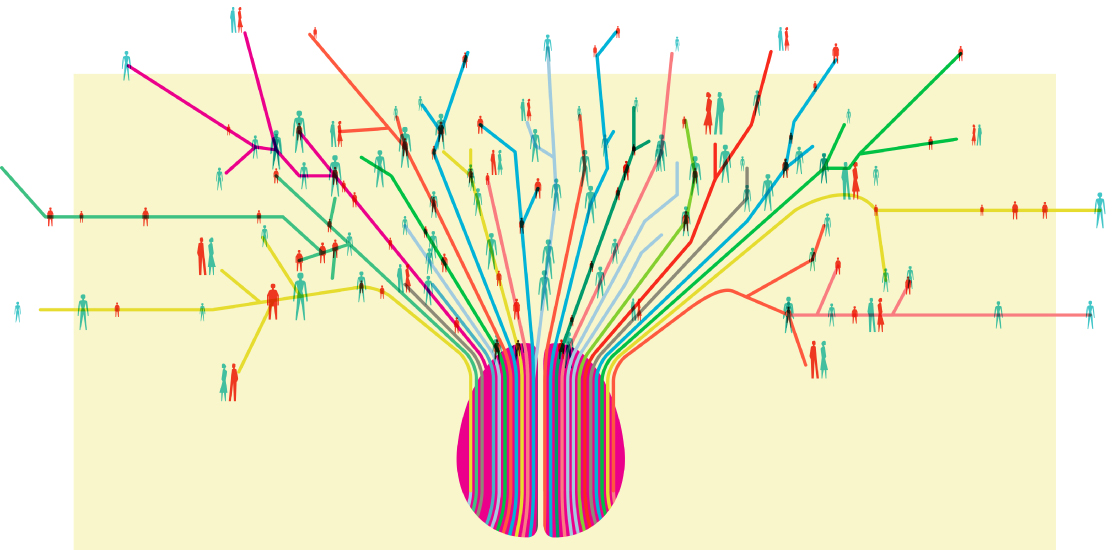THIS ARTICLE IS MORE THAN FIVE YEARS OLD
This article is more than five years old. Autism research — and science in general — is constantly evolving, so older articles may contain information or theories that have been reevaluated since their original publication date.
Dear Readers,
2017 was the year we at Spectrum committed to being open — to new ideas, new types of stories, new ways of telling them and new ways to reach you, our audience.
For example, as I promised in last year’s letter to you, we made our podcast, “Spectrum Stories” a regular feature. The audio format allows you to engage with the people in our stories in a different way than our articles do. Please listen — and if you like what you hear, subscribe on iTunes, SoundCloud or your platform of choice, or listen on our site.
This year, we also featured a new video series hosted by autism researchers Raphael Bernier and James Mancini, our ‘Autism Anchors.’ In their June debut, as part of our special report on autism genetics, they gave the inside scoop on the unexpected insights families can provide about the condition. And in November, they tackled the ever-popular topic sleep in autism, also as part of a special report, “Sleepless on the spectrum.” They also wrapped up the highlights of autism research in 2017 as part of our year-end special.
We’ve long hosted videos of a different sort: webinars with leading autism researchers. This year, our engagement editor Claire Cameron experimented with a new format — a video ‘Journal club.’ We had early-career researchers present work that set the field abuzz: two papers on treatments for Rett syndrome and two on the role of mosaic mutations in autism
Apart from new formats, we also tackled topics that are a bit off our usual path.
Spectrum’s mission has always been to cover autism research — and as such, we’ve rarely waded into politics, apart from articles about, say, how the federal budget might affect research funding. This year, however, science and politics clashed in ways we could not ignore.
The year kicked off with news that Donald Trump, then the U.S. president-elect, would invite Robert F. Kennedy Jr., a staunch anti-vaccine activist, to lead a ‘vaccine safety panel.’ David Mandell, an autism researcher at the University of Pennsylvania, wrote a scathing indictment of this idea, and urged readers to fight instead for healthcare and education for people with disabilities.
Then in February came news that President Trump had nominated billionaire Betsy DeVos as his education secretary. Autism researchers balked at this choice. “We are in deep, deep trouble as an autism community in the next four years,” Matthew Siegel, faculty scientist at the Maine Medical Center Research Institute, told us. Siegel and others were also concerned about DeVos’ involvement in the company Neurocore, which peddles a questionable treatment called neurofeedback for autism and other conditions.
That month, Trump’s travel ban prompted Abraham Al-Ahmad, a researcher in Texas who is a citizen of Syria, to write an impassioned screed about the ban’s potential to slow scientific progress. Ahead of the March for Science on 22 April, autism geneticist Jonathan Sebat declared that he planned to march “in solidarity with a diverse scientific community.” Fortunately, the proposed travel ban did not deter scientists worldwide from attending the International Meeting for Autism Research in San Francisco in May.
Our reporters, too, traveled far to find impactful stories. Our senior news writer, Nicholette Zeliadt, flew to Australia to investigate motor problems in autism. And in September, she traveled to Ethiopia and South Africa for a sobering look at why autism remains hidden in Africa. More figuratively, Brendan Borrell, a regular contributor, spent months looking into Son-Rise, a controversial therapy for autism, and found many parents who abandon mainstream approaches for this expensive but unproven treatment.
Controversial stories are hard to do, but can also be rewarding — sometimes literally. A close look at electroconvulsive therapy, also called ‘shock therapy,’ for some children with autism raised hackles among many in the community but won a first-place award from the Association of Health Care Journalists. Another story by Borrell, on the so-called ‘monkey island,’ won a third-place award from the same organization.
All of these articles require teamwork, and I am deeply grateful to our team for their intelligence, hard work and commitment to accuracy. This year we welcomed two more members: features editor Kristin Ozelli, who shepherds all of our Deep Dives, and Hannah Furfaro, a new reporter.
Most of all, we are grateful to you. As we know from your emails, Facebook comments and tweets, you are close and careful readers, and you motivate us to do our best.
Thank you for your continued interest. From all of us at Spectrum, we wish you good cheer and a happy new year.
— Apoorva Mandavilli and the Spectrum team

By joining the discussion, you agree to our privacy policy.